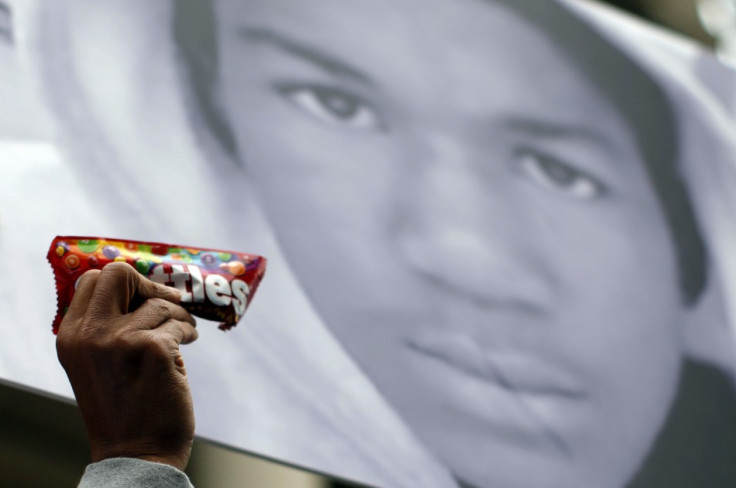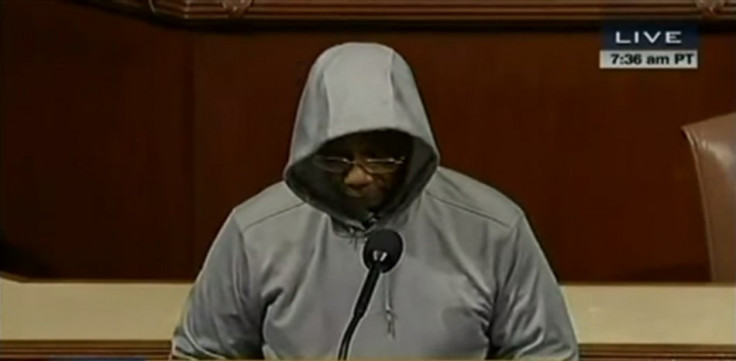Trayvon Martin, George Zimmerman and America's Boiling Cauldron of Race

The outcry over the shooting of black teenager Trayvon Martin has sparked debates over racial stereotyping and self-defence laws in the United States.
Neighbourhood watch member George Zimmerman, 28, shoot Martin after confronting him in Sanford, Florida, on 26 February. Zimmerman thought Martin, who was wearing a hooded jumper, looked suspicious.
Martin, 17, had been visiting relatives in the area and was carrying nothing more than a pack of Skittles and a canned drink when he was killed.
Thousands rallied to protest against the killing, in which no charges were filed against Zimmerman due to a Stand Your Ground law which permits deadly force in cases of self-defence.
The flames of outrage were fanned further when a recording of Zimmerman's 911 call, in which he appears to use a racial slur, was released on YouTube.
Claims of racial profiling and anger over what was first presumed to be a white-on-black killing were complicated when Zimmerman's father described him as a "Spanish speaking minority". Zimmerman described himself as "Hispanic" on voter registration forms.
The argument continued to rage on Twitter, with right-wing group members applauding the fact that the shooter was Hispanic, meaning their white followers would not immediately be blamed.
"I'm actually happy that George Zimmerman is Hispanic so the usual white people are all guilty by virtue of their skin color stuff won't work," said a March 22 tweet by John Hawkins, who described himself as a professional blogger at Right Wing News.
Manuel Pastor, a professor of American studies and ethnicity at the University of Southern California, told the Associated Press that the race of the shooter was not a priority in the debate over the shooting.
"It's easy to label this as an act of white racism, but it's really an act of stereotyping, which many groups are capable of and it is occurring in the context of extraordinarily permissive laws," Pastor said.
Pastor's criticism is aimed at the Stand Your Ground law that tweaks national self-defence legislation - which allows you to use deadly force if you feel threatened - and widens it to include "any other place where he or she has a right to be".
The bill was passed in April 2005 and opposed by only 20 out of 153 legislators in Florida. It has been enacted in 24 other states since then.
Florida Senator Chris Smith told CNN he believed the Stand Your Ground law is ambiguous.
"How many people in the streets of Florida are going to think, 'Hey, we have this great Stand Your Ground law, I can pick a fight at the Miami Dolphins game and when someone approaches me aggressively I can shoot them?'" he said.
Indeed, Illinois congressman Bobby Rush was escorted off the floor of the US House of Representatives when he wore a hooded jumper to give a speech condemning racial profiling.

He said: "Just because someone wears a hoodie, does not make them a hoodlum."
Acting speaker Greg Harper ruled Rush out-of-order and had him escorted out of the House. Rush later told the Washington Post: "I applaud the young people all across the land who are making a statement about hoodies, about the real hoodlums in this nation, especially those who tread on our law wearing official or quasi-offical cloaks."
Florida governor Rick Scott said the law could only be reviewed after the Martin case is resolved. The case is being investigated by a local grand jury, the Florida State Attorney's Office and several federal agencies.
Beyond that, there is the question of tensions between Hispanics and blacks. Florida also has had its share of this, namely last year's shootings of black men by Cuban-American officers in Miami.
As anti-Hispanic and anti-immigrant rhetoric has intensified in recent years, many Latinos have come to hold their collective breath when a crime occurs, many thinking: Please don't let the perpetrator be Latino. Please don't let the perpetrator be an immigrant. Please don't let the perpetrator be in the country illegally.
"It pains me to see that someone who identifies himself as Latino was involved in this," Janet Murguia, president of the National Council of La Raza (the largest US Latino civil rights organisation) said. "But I want to make very clear that being Hispanic does not excuse or absolve George Zimmerman of his actions."
© Copyright IBTimes 2025. All rights reserved.





















